新概念英语第三册语法总结:名词性从句
新概念英语第三册语法语法名词性从句课件
为了使句子平衡,常用it 作形式主语
主语从句不可位于句首的情况:
(1)if 引导的主语从句不可居于句首。 Whether we will hold a party in the open air tomorrow depends on the weather.
1.宾语从句的引导词:
that, whether, who, whom, whose, what, which, when,
What you said was right.
4).在表示建议、命令、要求时,如advice, suggestion, proposal, order, demand, request等词后 的名词性从句,谓语通常用should+动词原形。
His suggestion is that we should arrive there ten minutes earlier.
business.
A. What
B. Who
C. That
D. Whether
用关系词填空
whother
单项填空
1.The question is _C___the film is worth seeing.
A. if B. what C. whether D. how
1. Someone is ringing the doorbell. Go and see ____.
A. who is he
B. who he is
C. who is it
D. who it is
2. Can you make sure ___ the gold rings? A. where she had put B. where had she put C. where she has put D. where has she put
新概念英语第三册语法精粹(终稿)

B.as引导非限制性定语从句时,作用与which相同,as作为关系代词代替整个主句。
???(这是语法考试的一个考点。)
[注意区别]:
as引导的从句用于句首、句中或句后,而which引导的定语从句不能放在句首。
新概念三册语法精粹
第一章定语从句
1.定语从句:由关系代词who,whom,whose,that,which;关系副词when,where,why引导。
(下面十个句子请读5遍并脱口译出!)
1.Thedeathnoticestellusaboutpeoplewhohavediedduringtheweek.
?(Youdidn'tcomehereearlier.)
3.与将来事实相反的虚拟:
(1)If+should+v.,...would+v.
3.Theproblemiswhatwe'lldonext.(表语从句)
4.Wehavenoideathathehascomeback.(同位语从句)
?
同位语(Appositive):
同位语是英语语法的重点内容,也是各来自考试中的一个考点,同时,在写作中正确运用同位语可以使你的句型更加简洁得体。
《新概念英语》第三册第一课有这样一个句子:WhenreportscameintoLondonzoothatawildpumahadbeenspottedforty-fivemilessouthofLondon,theywerenottakenseriously.
③时间:after,before,when,while,as,until,assoonas,since,bythetime,once,lately,presently,shortlyafter,currently,atpresent,nowadays...
新概念英语第3册语法之欧阳美创编
新概念第三册语法精粹第一章英语从句Subordination英语从句主要有定语从句,状语从句和名词性从句(主语从句,宾语从句,表语从句,同位语从句)一.定语从句1.定语从句:由关系代词 who, whom, whose, that, which; 关系副词 when, where, why 引导。
(下面十个句子请读 5遍并脱口译出!)1.The death notices tell us about people who have died during the week.2. The man (whom) you spoke to just now is my friend.3. The building whose lights are on is beautiful.4. Please find a place which we can have a private talk in.5. The knee is the joint where the thighbone meets the large bone of the lower leg.6. He still remembers the day when he went to school.7. It is no need telling us the reason why you didn't finish it in time.8. He has three sons, two of whom died in the war.9. Mr. Smith, whose wife is a clerk, teaches us English.10. In the Sunday paper there are comics, which children enjoy.2.只能用that和who引导的定语从句A.all, nothing, anything, a few, one做先行词指物时B.先行词前有形容词最高级修饰时,后面常跟that而不是which.C.先行词前有 the only, the first, the last, the next, the very等词修饰时,引导词只能用that。
(完整word版)新概念英语第三册重点语法总结:名词性从句,推荐文档.docx
新概念英语第三册重点语法总结:名词性从句王牌要点:通常由that或疑问词导出。
1.How some mammals came to live in the sea isnot know.( 主语从句 )2.The attorney told his client that they had littlechance of winning the case.(宾语从句)3.The problem is what we'll do next.(表语从句 )4.We have no idea that he has come back.(同位语从句 )同位语 (Appositive):同位语是英语语法的重点内容,也是各类考试中的一个考点,同时,在写作中准确使用同位语能够使你的句型更加简洁得体。
《新概念英语》第三册第一课有这样一个句子: When reports came into London zoo that a wild puma had been spotted forty-fivemiles south of London, they were not taken seriously.( 当伦敦动物园接到报告说,在伦敦以南 45 英里处发现一只美洲狮时,这些报告并没有受到重视。
)在这里, a wild puma had been spotted forty-five milessouth of London 就是同位语从句,它本来应该放在“reports ”后面,这里却被放在了谓语成分 came into London zoo 的后面,目的是让句型显得更为稳重。
I.简单记忆:同位语从句,就是对某些名词做进一步的解释的句子。
I was greatly shocked when I heard the news that hisfather died yesterday.(that 引的句子解了news 的内容,注意: that不做任何成分)We have to face the fact that the weather isunexpectedly bad.(that 引的句子解了fact的内容)II.想:能接同位从句的名有:belief(信仰),fact,idea,doubt,rumor( 言 ) ,evidence( 据 ) ,conclusion() ,suggestion(建) ,problem ,order ,answer,discovery()explanation(解) ,principle(原),possibility(可能性),truth,promise(承) ,report( 告 ) ,statement( 声明 ) ,knowledge( 知 ) ,opinion( 点 ) ,likelihood(可能性)[大声朗三遍,背下即可。
新概念英语语法:名词性从句表格总结

though
although
if
even though/if
while
whatever
in spite of
wherever
however
whenever
whoever
方式状语从句
as as if/though
比较状语从句
as..as
not so/as..as
the same as
such…as
缺主语
缺宾语
缺定语
时间
地点
方式
原因
主语从句
人:who
人:who/whom
Which
When
Where
How
Why
物:what
物:what
备注
⒈主语从句中不缺任何成分时,That不能省.
⒉主语从句中只能用Whether.
⒊主语从句中可用It代替主语.
表语从句
人:who
人:who/whom
Which
When
point when / point where
⒋ during which time. 在…期间
by which time. 到…时间为止
状语从句
连接词
时间状语从句
when
whenever
while
as
before
after
till
until
since
as soon as
hardly...when
⒊ 宾语从句中,用陈述句语序
除:What's wrong with you?
What's the matter with you?
新概念英语第三册从句语法讲解课件及习题

A.which B.That C.What D.Whether
9. The town is no longer ago.
A.which
C.what
C it was ten years
B.that D.when
10.Word came A.which C.that
A.what B.That C.which D.Who
3. D I can’t understand is
he
wants to change his mind.ຫໍສະໝຸດ A.That , that
B.Which , what
C.What , what D.What, why
4.It is possible I said.
out +that-clause
• __C___ he will come and help you is
certain.
• __C___ there is life on the moon is an
interesting question.
A. What B. that C. whether D. if
enough money.
2)做介词宾语
• She always thinks of how she can work well.
• We must make it clear that anyone who breaks the law will be punished.
• You may depend on it that they will support you.
新概念英语第三册语法精粹1
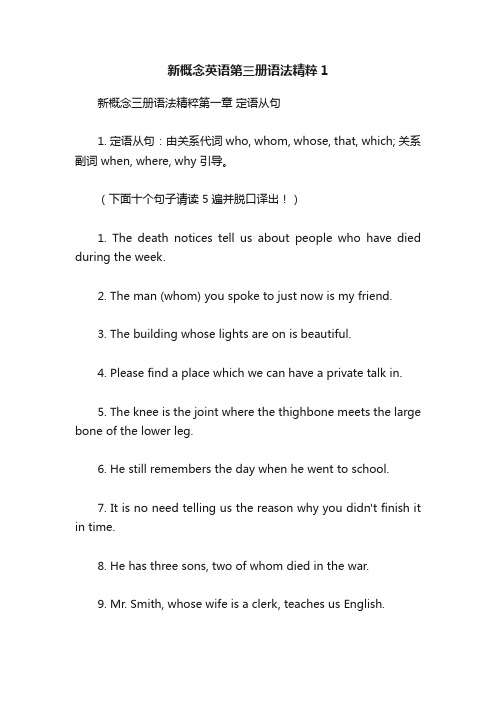
新概念英语第三册语法精粹1新概念三册语法精粹第一章定语从句1. 定语从句:由关系代词 who, whom, whose, that, which; 关系副词 when, where, why 引导。
(下面十个句子请读 5遍并脱口译出!)1. The death notices tell us about people who have died during the week.2. The man (whom) you spoke to just now is my friend.3. The building whose lights are on is beautiful.4. Please find a place which we can have a private talk in.5. The knee is the joint where the thighbone meets the large bone of the lower leg.6. He still remembers the day when he went to school.7. It is no need telling us the reason why you didn't finish it in time.8. He has three sons, two of whom died in the war.9. Mr. Smith, whose wife is a clerk, teaches us English.10. In the Sunday paper there are comics, which children enjoy.2. 只能用that和who引导的定语从句A.all, nothing, anything, a few, one做先行词指物时B.先行词前有形容词最高级修饰时,后面常跟that而不是which.C.先行词前有 the only, the first, the last, the next, the very 等词修饰时,引导词只能用that。
新概念英语第三册语法

第一章英语从句Subordination英语从句主要有定语从句,状语从句和名词性从句(主语从句,宾语从句,表语从句,同位语从句)一.定语从句定语从句:由关系代词who, whom, whose, that, which; 关系副词when, where, why 引导。
(下面十个句子请读5遍并脱口译出!)1. The death notices tell us about people who have died during the week.2. The man (whom) you spoke to just now is my friend.3. The building whose lights are on is beautiful.4. Please find a place which we can have a private talk in.5. The knee is the joint where the thighbone meets the large bone of the lower leg.6. He still remembers the day when he went to school.7. It is no need telling us the reason why you didn't finish it in time.8. He has three sons, two of whom died in the war.9. Mr. Smith, whose wife is a clerk, teaches us English.10. In the Sunday paper there are comics, which children enjoy.只能用that和who引导的定语从句A.all, nothing, anything, a few, one做先行词指物时B.先行词前有形容词最高级修饰时,后面常跟that而不是which.C.先行词前有the only, the first, the last, the next, the very等词修饰时,引导词只能用that。
新概念英语第三册名词性从句课件

3. Do you doubt that he did it on his own?
肯定句中用 if / whether 否定句中用 that 疑定句中用 that
1. I doubt i_f_/_w_h_e_t_h_e_rhe is telling the truth. 2. We never doubt ___t_h_a_t ___ the plan will be carried out . 3. Does he doubt ___t_h_at____ you are from Austria? 4. I’m doubtful i_f_/_w__h_et_h_e_r he will agree to this.
We have made it clear that a foreign language is useful weapon in the struggle of life.
exercise
correction
which不做介词宾语
1. The emperor was pleased by whiacth the minister told him about it. 2. Are you sorry for that you have annoyed him? that不做介词宾语 3. I find thiat tntehciesssshaoryultdhabtethkiespsthsoeucrldetbfeorktehpet tsiemxerebtfeoirngthneetcimesesabreyi.ng
1. The truth is that he has never been to the countryside.
新概念英语第三册名词性从句复习课件

他没来上学,这就是为什么他被惩罚了
√A. why
B. because C. that
D. the reason
(二)表语从句
二、表语从句的虚拟语气 1.
若主语为这些词的同根名词,表语从句用虚拟语气:
(should)+动词原形
His proposal is that the dam (should)be built at the foot of the mountain. 他的建议是把大坝建在山脚下。
(一)主语从句
一、连接词
(一)主语从句
一、连接词
(一)主语从句
3. 连接代词(who, what, which,whoever, whatever…)
以及连接副词(where, when, why, wherever…),在从句
中担任成分且有意义。
When does he leave?
When he leaves is his own decision(. when在从句中作状语)
(一)主语从句
二、it作形式主语 如果主语从句太长,为了避免句子结构头重 脚轻,可以用it做形式主语,而把主语从句 放在主句谓语部分之后。
(一)主语从句
It’s likely that he will apply for this job.
(一)主语从句
2.It+be+n.+ 主语从句 句式: It is a good thing/ no wonder/a pity/ a shame…… It is a fact that he cheated in the exam. It is a pity that you missed such a good chance. 汉译英:他们是否会支持我们这是一个问题。 _I_t_is__a_p_r_o_b_l_e_m__w_h_e_t_h_e_r_t_h_e_y_w__il_l _su_p_p__o_rt_u_s_._____
新概念英语第3册语法之欧阳家百创编

新概念第三册语法精粹欧阳家百(2021.03.07)第一章英语从句Subordination英语从句主要有定语从句,状语从句和名词性从句(主语从句,宾语从句,表语从句,同位语从句)一.定语从句定语从句:由关系代词 who, whom, whose, that, which; 关系副词 when, where, why 引导。
(下面十个句子请读 5遍并脱口译出!)1.The death notices tell us about people who have died during the week.2. The man (whom) you spoke to just now is my friend.3. The building whose lights are on is beautiful.4. Please find a place which we can have a private talk in.5. The knee is the joint where the thighbone meets the large bone of the lower leg.6. He still remembers the day when he went to school.7. It is no need telling us the reason why you didn't finish it in time.8. He has three sons, two of whom died in the war.9. Mr. Smith, whose wife is a clerk, teaches us English.10. In the Sunday paper there are comics, which children enjoy.只能用that和who引导的定语从句A.all, nothing, anything, a few, one做先行词指物时B.先行词前有形容词最高级修饰时,后面常跟that而不是which.C.先行词前有 the only, the first, the last, the next, the very等词修饰时,引导词只能用that。
新概念3句型总结

新概念3句型总结.doc新概念英语第三册句型总结引言《新概念英语第三册》是一套旨在提高学习者英语阅读、写作、听力和口语能力的教材。
本文档将对第三册中的句型进行详细总结,帮助学习者更好地理解和运用英语句型。
第一部分:句型概述1. 简单句定义:只有一个主语和一个谓语的句子。
例句:She is a student.2. 并列句定义:使用并列连词(如and, but, or等)连接两个或多个简单句。
例句:He tried to phone me, but I was out.3. 复合句定义:包含一个主句和一个或多个从句的句子。
例句:Although he is old, he is still very active.第二部分:主要从句类型1. 名词性从句定义:在句子中充当名词的角色。
例句:What he said is true.2. 定语从句定义:修饰名词或代词的从句。
例句:The man who is talking to John is my uncle.3. 状语从句定义:表示时间、地点、原因、目的、结果等的从句。
例句:If it rains, the match will be postponed.4. 条件状语从句定义:表示条件的从句。
例句:Unless we act now, we will miss the opportunity. 第三部分:特殊句型1. 虚拟语气定义:用来表达假想、愿望或不太可能发生的情况。
例句:If I were you, I would accept the offer.2. 强调句型定义:通过倒装或某些特定结构来强调句子的某一部分。
例句:It was not until I got home that I realized I had forgotten my keys.3. 疑问句定义:询问信息的句子。
例句:Have you finished your homework?4. 否定句定义:含有否定意义的句子。
(完整版)新概念英语第3册课文解析
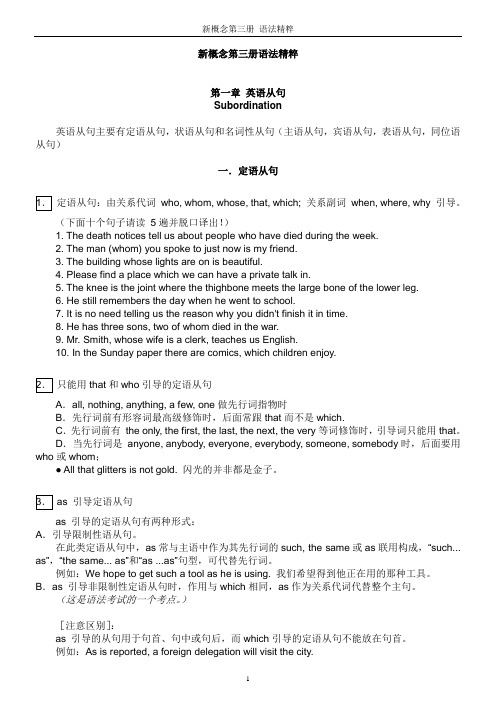
新概念第三册语法精粹第一章英语从句Subordination英语从句主要有定语从句,状语从句和名词性从句(主语从句,宾语从句,表语从句,同位语从句)一.定语从句定语从句:由关系代词who, whom, whose, that, which; 关系副词when, where, why 引导。
(下面十个句子请读5遍并脱口译出!)1. The death notices tell us about people who have died during the week.2. The man (whom) you spoke to just now is my friend.3. The building whose lights are on is beautiful.4. Please find a place which we can have a private talk in.5. The knee is the joint where the thighbone meets the large bone of the lower leg.6. He still remembers the day when he went to school.7. It is no need telling us the reason why you didn't finish it in time.8. He has three sons, two of whom died in the war.9. Mr. Smith, whose wife is a clerk, teaches us English.10. In the Sunday paper there are comics, which children enjoy.只能用that和who引导的定语从句A.all, nothing, anything, a few, one做先行词指物时B.先行词前有形容词最高级修饰时,后面常跟that而不是which.C.先行词前有the only, the first, the last, the next, the very等词修饰时,引导词只能用that。
新概念英语第三册语法精粹:从句的使用
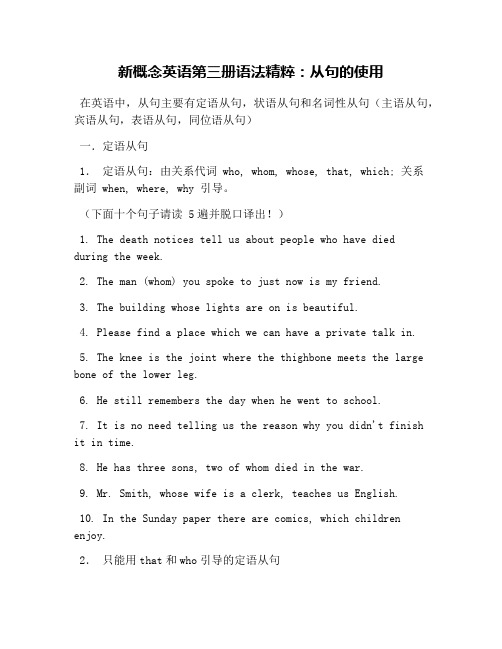
新概念英语第三册语法精粹:从句的使用在英语中,从句主要有定语从句,状语从句和名词性从句(主语从句,宾语从句,表语从句,同位语从句)一.定语从句1.定语从句:由关系代词 who, whom, whose, that, which; 关系副词 when, where, why 引导。
(下面十个句子请读 5遍并脱口译出!)1. The death notices tell us about people who have diedduring the week.2. The man (whom) you spoke to just now is my friend.3. The building whose lights are on is beautiful.4. Please find a place which we can have a private talk in.5. The knee is the joint where the thighbone meets the large bone of the lower leg.6. He still remembers the day when he went to school.7. It is no need telling us the reason why you didn't finish it in time.8. He has three sons, two of whom died in the war.9. Mr. Smith, whose wife is a clerk, teaches us English.10. In the Sunday paper there are comics, which children enjoy.2.只能用that和who引导的定语从句A.all, nothing, anything, a few, one做先行词指物时B.先行词前有形容词级修饰时,后面常跟that而不是which.C.先行词前有 the only, the first, the last, the next, the very等词修饰时,引导词只能用that。
新概念英语第3册语法之欧阳德创编

新概念第三册语法精粹第一章英语从句Subordination英语从句主要有定语从句,状语从句和名词性从句(主语从句,宾语从句,表语从句,同位语从句)一.定语从句1.定语从句:由关系代词who, whom, whose, that, which; 关系副词 when, where, why 引导。
(下面十个句子请读 5遍并脱口译出!)1.The death notices tell us about people who have died during the week.2. The man (whom) you spoke to just now is my friend.3. The building whose lights are on is beautiful.4. Please find a place which we can have a private talk in.5. The knee is the joint where the thighbone meets the large bone of the lower leg.6. He still remembers the day when he wentto school.7. It is no need telling us the reason why you didn't finish it in time.8. He has three sons, two of whom died in the war.9. Mr. Smith, whose wife is a clerk, teaches us English.10. In the Sunday paper there are comics, which children enjoy.2.只能用that和who引导的定语从句A.all, nothing, anything, a few, one做先行词指物时B.先行词前有形容词最高级修饰时,后面常跟that而不是which.C.先行词前有the only, the first, the last, the next, the very等词修饰时,引导词只能用that。
新概念三的语法知识点总结
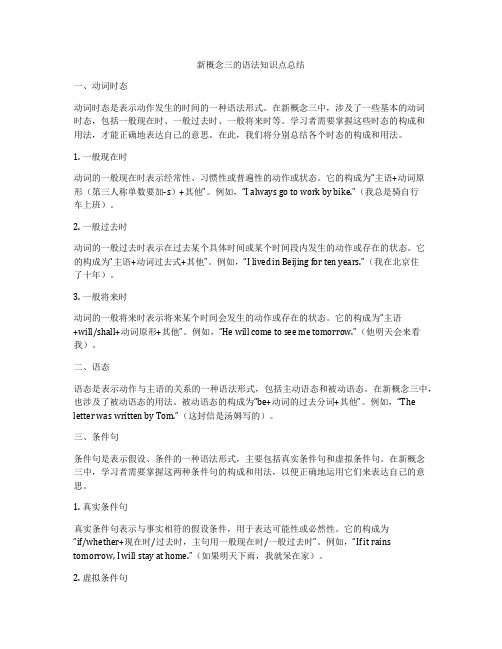
新概念三的语法知识点总结一、动词时态动词时态是表示动作发生的时间的一种语法形式。
在新概念三中,涉及了一些基本的动词时态,包括一般现在时、一般过去时、一般将来时等。
学习者需要掌握这些时态的构成和用法,才能正确地表达自己的意思。
在此,我们将分别总结各个时态的构成和用法。
1. 一般现在时动词的一般现在时表示经常性、习惯性或普遍性的动作或状态。
它的构成为“主语+动词原形(第三人称单数要加-s)+其他”。
例如,“I always go to work by bike.”(我总是骑自行车上班)。
2. 一般过去时动词的一般过去时表示在过去某个具体时间或某个时间段内发生的动作或存在的状态。
它的构成为“主语+动词过去式+其他”。
例如,“I lived in Beijing for ten years.”(我在北京住了十年)。
3. 一般将来时动词的一般将来时表示将来某个时间会发生的动作或存在的状态。
它的构成为“主语+will/shall+动词原形+其他”。
例如,“He will come to see me tomorrow.”(他明天会来看我)。
二、语态语态是表示动作与主语的关系的一种语法形式,包括主动语态和被动语态。
在新概念三中,也涉及了被动语态的用法。
被动语态的构成为“be+动词的过去分词+其他”。
例如,“The letter was written by Tom.”(这封信是汤姆写的)。
三、条件句条件句是表示假设、条件的一种语法形式,主要包括真实条件句和虚拟条件句。
在新概念三中,学习者需要掌握这两种条件句的构成和用法,以便正确地运用它们来表达自己的意思。
1. 真实条件句真实条件句表示与事实相符的假设条件,用于表达可能性或必然性。
它的构成为“if/whether+现在时/过去时,主句用一般现在时/一般过去时”。
例如,“If it rains tomorrow, I will stay at home.”(如果明天下雨,我就呆在家)。
新概念英语第3册语法之欧阳法创编

新概念第三册语法精粹第一章英语从句Subordination英语从句主要有定语从句,状语从句和名词性从句(主语从句,宾语从句,表语从句,同位语从句)一.定语从句1.定语从句:由关系代词who, whom, whose, that, which; 关系副词 when, where, why 引导。
(下面十个句子请读 5遍并脱口译出!)1.The death notices tell us about people who have died during the week.2. The man (whom) you spoke to just now is my friend.3. The building whose lights are on is beautiful.4. Please find a place which we can have a private talk in.5. The knee is the joint where the thighbone meets the large bone of the lower leg.6. He still remembers the day when he went to school.7. It is no need telling us the reason why you didn't finish it in time.8. He has three sons, two of whom died in the war.9. Mr. Smith, whose wife is a clerk, teaches us English.10. In the Sunday paper there are comics, which children enjoy.2.只能用that和who引导的定语从句A.all, nothing, anything, a few, one做先行词指物时B.先行词前有形容词最高级修饰时,后面常跟that而不是which.C.先行词前有 the only, the first, the last, the next, the very等词修饰时,引导词只能用that。
- 1、下载文档前请自行甄别文档内容的完整性,平台不提供额外的编辑、内容补充、找答案等附加服务。
- 2、"仅部分预览"的文档,不可在线预览部分如存在完整性等问题,可反馈申请退款(可完整预览的文档不适用该条件!)。
- 3、如文档侵犯您的权益,请联系客服反馈,我们会尽快为您处理(人工客服工作时间:9:00-18:30)。
王牌要点:通常由that或疑问词导出。
1. How some mammals came to live in the sea is not known.(主语从句)
2. The attorney told his client that they had little chance of winning the case.(宾语从句)
3. The problem is what we'll do next.(表语从句)
4. We have no idea that he has come back.(同位语从句)
同位语(Appositive):
同位语是英语语法的重点内容,也是各类考试中的一个考点,同时,在写作中正确运用同位语可以使你的句型更加简洁得体。
《新概念英语》第三册第一课有这样一个句子:When reports came into London zoo that a wild puma had been spotted forty-five miles south of London, they were not taken seriously.(当伦敦动物园接到报告说,在伦敦以南45英里处发现一只美洲狮时,这些报告并没有受到重视。
)在这里,a wild puma had been spotted forty-five miles south of London就是同位语从句,它本来应该放在“reports”后面,这里却被放在了谓语成分came into London zoo的后面,目的是让句型显得更为稳重。
I.简单记忆:同位语从句,就是对某些名词做进一步的解释的句子。
I was greatly shocked when I heard the news that his father died yesterday. (that 引导的句子解释了news的内容,注意:that不做任何成分)
We have to face the fact that the weather is unexpectedly bad. (that 引导的句子解释了fact的内容)
II.联想记忆:
能接同位词从句的名词有:belief(信仰),fact,idea,doubt,rumor(谣言),evidence(证据),conclusion(结论),suggestion(建议),problem,order,answer,discovery(发现)explanation(解释),principle(原则),possibility(可能性),truth,promise(承诺),report (报告),statement(声明),knowledge(知识),opinion(观点),likelihood(可能性)
III.王牌要点:
● 同位语一般由that引导,但也可以用关系代词which, who, what和关系副词when, where, why, how或whether 引导。
There arouse the question whether we could win the game.
I have no idea howto explain it.
● 一些介词词组后面也能引导同位语从句。
(非常经典之功能句式,可用于四六级和托福作文,不妨一试!)
on the assumption(在……前提下),
on the ground(由于……原因),
on the condition that(在……条件下),
with the exception(有……例外)
owing to the fact(由于……事实),
on the understanding(基于……理解)
e.g. The young lady promised to marry the old man on the condition that he bought her a villa. (那位年轻的女士答应嫁给那位老头,条件是他给她买一幢别墅。
)
IV.分隔式同位语从句
为了使句型平衡不至于头重脚轻,有时同位语从句可以放到句子的末尾,(读两遍此定义,然后看倒句:)
An idea came to him that he might write to her to ask more information about the matter.
I got information from my friend that there will be a marvelous American movie "Titanic".
V. 同位语从句与定语从句之区别
简单记忆:定语从句的引导词that 或which在句子中用作主语或宾语,而同位语从句的引导词that只起连接主句和从句之作用,不用作任何成分。
e.g. I've got an answer that A is right. (同位语从句,that 不做成分)
I've got an answer that surprised me a lot.(定语从句,that做定语从句的主语)
VI.王牌重点:可以充当同位语的词组或短语。
1)名词短语。
(使句型更为简洁)
Bill Clinton, the president of America, came to China to pay an official visit in 1998.
Lu Xun, one of the greatest essayists in China, played an overwhelmingly important role in Chinese literature history.
2)动名词词组亦可用作同位语:别忘了加逗号。
(使句型更为流畅)
I'm crazy about the game, playing baseball.
Going to concert, that sounds a great idea.
3)不定式短语。
(陌生只是掌握的开始)
The problem what to do next remains unsolved.
Her claim to have finished his work is nothing but a white lie.
4)形容词词组。
(有逗号隔开)
All the workers, young or old, should be treated equally.
Young man, short or tall, should have the right to take the opportunity.
VII. 同位语的引导词。
(重要!这是中高级写作中不可缺少的引导成分)
引导词用来表示同位语与它所说明的同位成分之间的关系:
1.namely, that it is, that is to say(也就是说), in other words(换句话说), or, for short 表示等同关系。
2.such as, say, so to speak(譬如说), including(包括), for instance(或for example (e.g. / eg),表示举例和列举关系。
3.especially, mostly, chiefly, or better, in particular, particularly表示突出重点,(在高难度阅读中表示后面的部分为更重要或更突出的部分,是出题的关键点。
)。
